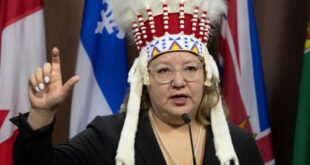Ahmed Qudaih has been waiting more than a month for response from federal government

Ahmed Qudaih says that while his family sheltered from bombings in a school in Gaza, he sat in a Saskatoon condo asking himself if he was dreaming.
Qudaih, 29, lives in Saskatoon as a permanent resident, but he had to leave everything behind to get here — including his three brothers, three sisters and elderly parents.
Now he's doing everything in his power to bring three family members to Saskatoon.
"My mental health is destroyed. I'm tired all the time, I don't sleep," said Qudaih, speaking with the help of a translator during a recent interview with CBC in his Saskatoon refugee sponsor's condo.
Qudaih was born and raised in Khan Younis, a city in the southern Gaza Strip near the Mediterranean sea.
He said he grew up dreaming of a simple life, with freedom, safety and stability, but that the never-ending conflict between Israel and Palestinians made that impossible.
"I saw there was no future there or work or anything," he said.
"There's no way for us to progress. Every time we try to move forward, they bring us backward."
The Gaza Health Ministry says roughly 28,000 Palestinians have been killed since the start of the current war in October, which began after a deadly attack by Hamas took the lives of an estimated 1,200 Israelis.
Qudaih said his family home was bulldozed by Israeli forces back in the 2014 war, and destroyed again in this current conflict. They were displaced like thousands of others in Gaza in recent months.
He's only been able to talk with his mother and father for minutes in total since Oct. 7.
"I'm devastated, I've reached a point where I can't process what's going on, is this a dream?"
WATCH | This grocery store worker from Saskatoon is trying to get his 3 brothers out of Gaza:

This grocery store worker from Saskatoon is trying to get his 3 brothers out of Gaza
3 days ago
Ahmed Qudaih applied for three of the 1,000 Gaza visas being offered by the federal government to bring his brothers to Saskatoon, but can't afford to support them financially.
He periodically receives videos and photos from his brothers, most recently showing the conditions at the United Nations' UNRWA school in Khan Younis, where his family was taking shelter. At latest word they were headed to the city of Rafah.
As the conflict continues in Gaza, Qudaih is applying for three of the 1,000 Gaza visas being offered by the federal government to bring his brothers to Saskatoon, but said his hope is dwindling.
In January, Canada launched a temporary immigration program for family members of Canadians who are trapped in Gaza. The program offers three-year visas to up to 1,000 Palestinians whose family members are willing to support them while they are in Canada.
CBC reached out to Immigration, Refugees and Citizenship Canada about the 1,000-visa cap and why applications are taking as long as they are, among other things.
"IRCC continues to be flexible as we assess the situation, including the volumes of applications received and the ability to facilitate eligible family members to leave Gaza and reach a safe third country. Any new developments would be communicated publicly," the department emailed in response to the question about the cap.
IRCC specifically stated this is not a refugee program.
"Our goal is to provide a temporary pathway to safety and to keep families together during this ongoing crisis," it said.
It said applications are being processed, "on a priority basis, however, processing times will vary based on the details of each application."
The path to Saskatoon
Qudaih's journey to the Prairies wasn't easy.
In 2020 he travelled through the Rafah border crossing, paying a fee to the Egyptian government to be allowed to do so, spent more than a day travelling to the Cairo airport and eventually flew to Turkey.
He said he applied multiple times for various refugee programs, but was rejected time and time again.
Meanwhile one of Qudaih's brothers, Mohammed, was in contact with a Saskatoon organization willing to sponsor Mohammed and bring him to Saskatoon, but Mohammed was still in Gaza at that point and the border was closed. The refugee sponsorship spot was at risk of going to waste, so Qudaih ended up getting the spot instead.
Gayle Nemeth, a retired English teacher based in Saskatoon, and her husband were Qudaih's sponsors. Nemeth said it was approximately two-and-half years from the time they submitted the application to the time that Qudaih actually arrived in Canada.
Nemeth said Qudaih originally lived with her and worked full-time, but has since moved out and has been taking classes.
She said she hopes he'll be able to bring his brothers over soon and criticized the limited amount of visas being offered.
"We have lots of room here and we can certainly afford to offer a lot more visas than that," she said.
Limited visas
Sharry Aiken is an associate law professor at Queen's University, and an expert on immigration and refugee law.
She said the limit on visas is problematic on several levels and highlighted "the very high level of inconsistency" compared to other visa programs.
"It's frankly shocking in face of the absolute dire conditions that Palestinians are facing in Gaza today," she said.
Aiken said there are inconsistencies when comparing what Canada has done for Ukrainians — another short-term residency program — with the Gaza program.
Since March 2022, the federal government has issued 936,293 temporary emergency visas for Ukrainian nationals.
"The number of people coming in from Gaza would represent a tiny drop of the bucket," Aiken said.
"We could afford to magnify that cap tenfold and, you know, make no dent in the overall capacity of Canada to absorb those people."
Aiken said any Ukrainian national at risk was eligible to apply for the short-term visa, but people in Gaza need to have an anchor relative — a spouse, parent, grandparent or child, but not a cousin, aunt or uncle.
"That's particularly concerning in a context where we know many people have lost all their close nuclear family members, right?" Aiken said.
"They no longer have parents, they no longer have their spouse, they no longer have their children."
Aiken also pointed to how transportation loans and subsidies were offered to Ukrainian nationals, both to get to Canada in the first place and to support resettlement, but the government is not offering financial support to Palestinians fleeing Gaza. Instead their anchor relatives are expected to foot the entire bill.
Qudaih currently works night shifts and another part-time job while also attending morning classes. He said he still hasn't heard back from the federal government on the status of the applications or the fees he will need to pay.
ABOUT THE AUTHOR
Reporter
Liam O'Connor is a reporter for CBC Saskatchewan based in Saskatoon. O'Connor graduated from the University of Regina journalism school. He covers general news for CBC. You can reach him at liam.oconnor@cbc.ca.
With files from Raffy Boudjikanian
*****
Credit belongs to : www.cbc.ca
 MaharlikaNews | Canada Leading Online Filipino Newspaper Portal The No. 1 most engaged information website for Filipino – Canadian in Canada. MaharlikaNews.com received almost a quarter a million visitors in 2020.
MaharlikaNews | Canada Leading Online Filipino Newspaper Portal The No. 1 most engaged information website for Filipino – Canadian in Canada. MaharlikaNews.com received almost a quarter a million visitors in 2020.







